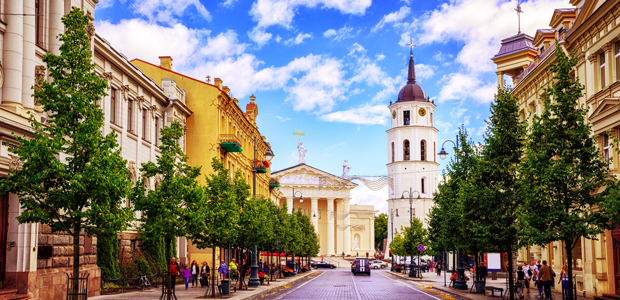
HotSpot: Lithuania
Ahh, Lithuania. Fleeting landscapes. An abundance of forests and lakes. Castles, picturesque houses, and those magical hot air balloons floating across the sky.
Their language is one of the oldest that is still spoken today, older than Celtic, German and even Greek. Heck, even their national sport is basketball (I genuinely had no idea).
But there’s something else brewing in the Baltic, and that’s Lithuania’s rapid ascent in the tech world. For starters, FinTech Lithuania has the most progressive Fintech regulations in the EU, nearly 1900 employees in this sector, and nearly 200 Fintech startups based in the country. It was ranked #4 on the Global Fintech Index in 2020, it ranked the fastest public Wi-Fi globally and 3rd in the world for 4G. New businesses can be up and running in as quick as 3 days, and children start learning about tech in primary schools, such as coding and building robots. Who could have guessed?!
So, when did this Lithuanian tech evolution start? In 2012, the country made it a priority to educate and build enthusiasm within their society for the rapidly expanding global tech network. With a population of just 2.8 million people, this education proved immensely beneficial, as at the end of 2012 there were around 120 startups in the country, and today, close to 1000, with two official unicorns. In fact, even the entertainment industry is heading over, with hit shows such as Stranger Things, Chernobyl, and more, being filmed in Lithuania for its natural beauty and tech efficiency.
What makes Lithuania different?
“Our top 20 startups are all profitable and growing very quickly on a global scale. We call them unofficial unicorns because you can evaluate them when they don’t attract investments,” says Roberta Rudokienė, Head of Startup Lithuania, which is the first stop for current and future startups in the country.
When asked what sets Lithuania apart from other Eastern European countries, she adds that, “Whereas we don’t have gold, mining, snow, or other natural resources, we’ve instead relied so much on educating our young people, with 94% being proficient in English, if not several other languages as well, which gives a big edge to foreign entrepreneurs who want to invest. So although we are a very small country with a small population, I believe the small size is actually a gift, and a new perspective for startup founders who are competing with much bigger countries.”
When asked how Lithuania has managed to stay so strong and resilient with everything from COVID, and then the war that’s still going on, Roberta says proudly, “We only just recently gained our independence. The fact that we have evolved so quickly in the world of tech and innovation is just something in our DNA. Our soviet history has made us very resilient, we know what real struggle is, and since there is not a lot of money circulating in our ecosystem, we don’t get discouraged if we don’t get immediate funding. With social media, the younger generation is seeing what’s possible, and they’re learning about the world, what is possible, and what it means to be successful. Since we already have the toughness and spirit, it’s just becoming a snowball effect of motivation to make great things.”
The Startup Ecosystem
According to statistics from Startup Lithuania, “the combined value of Lithuanian startups reached €7.1B – 17 times up since 2016. 2021 was also the year of the investment record – VCs invested €428M in Lithuanian-founded companies, 2.2 times smashing the previous record of 2018. Only 14% of the VC funding came from Baltics investors, other European investors granted 45%, and 37% came from the US.”
During the precariously detrimental pandemic many countries suffered immensely, but Lithuania prevailed substantially, as most startups actually managed to grow during this time. “The number of employees in Lithuanian startups rose by 15% in 2021, and their revenues and export volumes were up 192% compared to the first half of 2020,” reports Startup Lithuania.
The country is also showing its dedication to preventing online crime, with The Centre of Excellence in Anti-Money Laundering having recently started its activities in Lithuania. This centre helps financial market participants properly identify the risks regarding money laundering and terrorist financers and is working with banks all around Europe.
The Future
In an article by local resident Marius Ribokas, if the trends continue, the Lithuanian startup ecosystem is expected to grow 3 times: triple the startup jobs, triple the amount of taxes paid by startups, and triple the number of active startups in the country. He adds, “my personal guess is that it will not take any longer than 5 years.”
“The number of investments in startups and average investment size has been increasing sharply. Lithuania and other two Baltic countries are getting more and more attention from prestigious venture capital funds, and business angel networks are also expanding,” says Darius Verseckas, the former Technology Editor of Verslo Zinios, and co-founder of HeavyFinance, a fintech company.
Ryan Gilbert, the founder of Launchpad Capital – a Silicon Valley based VC fund – is more than confident Lithuania’s success will only continue to grow overseas. Aside from the obvious, he adds that, “the gender balance in Lithuania is really good. Gender equality is held in high regard.”

